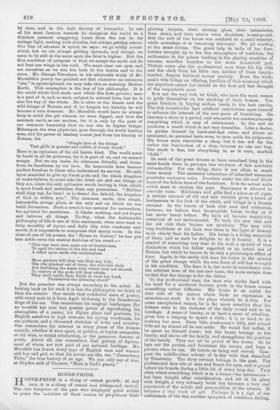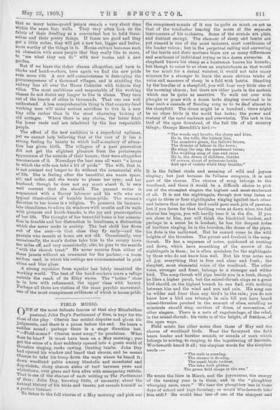HOUSE-PRIDE.
pa OUSE-PRIDE is a thing of recent growth ; at any rate, it is a thing of recent and widespread revival. The rich burghers of the past Who etnployed great artists to paint the interiore of their roinue, to perpetuate their glowing carpets, their shining glass, their tablecloths, their china, and their chaire were, doubtless, house-proud. ; But the cult of the house was confined to a small number, while nowadays it is becoming universal. We all worship at the same shrine. The great lady in halls of her fore- fathers brought up in the dim atmosphere of tradition, the. millionaire in his palace basking in the glaring sunshine of success, sacrifice together to the same household god. Thither come also the professional. man from his big villa and the clerk from hie little one, neither of them empty- hanaed, despite habitual money .anxiety. Even the work- man's Wife brings an Offering, heedless of that economy whieh her superiors assure her should be the first and last thought of the respectable poor.
It is not the very rich, we think, who have the most reason to pride themselves on the stocking Of their houses. Too, great freedom in buying seldom tends to the best results. The rich householder lays artificial restrictions upon himself to enhance the interest of the new game of furnishing. He. becomes a slave to a period, and sets aside too contemptuously everything which is easy of attainment. In the end he, produces a result which is not very homelike. Like a dealer, he guides himself by hard-and-fast rules, and allows no sentiment, no personal taste even, to turn aside his judgment. His house soon resembles a shop, but it has not for the visitor the fascination of a shop, because no one can buy. The stock is fine, but everything is, as it were, marked "Sold."
In such of the greats houses as have remained long in the same hands there is, perhaps, less evidence of this aesthetic whitusieality. For one thing, there is not often so much loose Money. The neceeeary admixture of inherited treasures precludes exclusive rules. Dwellers under the old roof think more of the fabric than of the furniture. It is the actual walls which seem to enclose the past. Sentiment is allowed to override taste. Heirlooms and gifts find a place as of right.. A certain amount of old and new rubbish gives a touch of lawleeeness to the look of the whole, and brings in a human element. In the hearts of both rich man and aristocrat, however, we believe that house-pride burns to-day as it has never burnt before. We have all become exquisitely conscious of our environment. To both the new rich and the old rich their houses are symbolic. The min with long traditions at his back sees them in the light of history more clearly than his father. His house is a living memorial of them, and as such be delights to do it honour. It is a symbol of something very dear to his soul, a symbol of that distinction which his father regarded as an actual law of Nature, but which he knows to be only a picturesque effect of time. Again, to the newly rich man his house is the symbol of the groat change which his own force of will has wrought in his condition. The finer it is, the more in accordance with the subtlest laws of the last new taste, the more certain does be feel that the change is for the better.
To the professional man, the man who works bard with his head for a moderate income, pride in his house means something rather different. His house is an outlet for that side of his nature Which finds no expression in monotonous work. It is the place wherein he is free. For some unexplained reason, he is far more sensitive than his fathers were to the dullness of the daily round and to its bondage. A sense of beauty, or at least a sense of rebellion, gives him it longing to spend a little ; it is so hard to do nothing but earn. State bills, tradesmen's bills, and school bills eat up almost all he can make. He would feel selfish if he spent on himself alone; but the house belongs to the family, and shows off the family, and strengthens the position of the family. They can all be proud of the house. So he lays out the garden, and furnishes the rooms, and buys a picture when he can. He insists on being well served. Com- pare the middle-class Manage of to-day with that described by Thackeray. The dirty servant belongs to the past. The professional man sits at ease and feasts his eyes, and is proud before his friends during a little bib of every long day. Very often where everything which is in a house—bar necessaries— has been bought after consideration, and set in its place with delight, a very ordinary brick box becomes a very real expression of the minds and personalities of the owners. It becomes a real work of art. Perhaps it is a sign of the restlestness of the day, another symptom of rebellious feeling,
that so many house-proud people remaiii a very abort time Within the same font. walls. They Very often look on the
fabric of their dwelling as a convenient box to hold them- selves and their pretty things. If tinted Are good and they get a little richer, they will get a new box, bigger and better, %ore worthy of the things in it. House-culture becomes such an obsession with some people that they really like to move, to "see what they can do" with new rooms and a new garden.
But if we leate the richer classes altogether, and turn to clerks and hand-workers, here again we find the new pride even more rife. A new self-consciousness is destroying the Picturesqueness of a thousand villages, and is studding the railway line all over the Home Counties with hideous tiny villas. The most ambitious and respectable of the working elapses do not desire any longer to live in slums. 'They turn out of the hearts of cities in thousands. That one can well understand. A less comprehensible thing is that country-bred working men will Make serious sacrifices to live in a new tiny villa rather than in the Most charming looking of old cottages. Where there is any cheioe, the latter fetch the lower rents and are inhabited by the lest respectable people.
The effect of the hew tunbitiou is 4 superficial ugliness, Yet we cannot help believing that at the root of it lies a strong feeling for beauty to which half-a-centtary of educa- tion has given birth. The villagers of a past generation did not get the slightest pleasure from the picturesque appearance of the outside of their homes; they Were altogether unconscious of it. nowadays the best men all want "a Louse in which the wife can take a bit of pride." The Wife, that is, Is not content any longer to do without. the ornamental side of life. She is feeling after the beautiful, she wants apace, air, and order, and she wants to plettite her eyes; and her husband, though he does not say much about it, is very well content that she should. The present writer is acquainted With a Surrey labourer and his wife who are
typical illustrations of humble house-pride. The wornan's devotion to her house is a religion. To preserve its immacu- late cleanliness, to adorn its windows with muslin and its walls With pictures and knick-knacks, is the joy and preoecitpation of her life. The thought of her beautiful home i8 her consola- tion in trouble and her distraction in loneliness, a distraction Which she never seeks in society. The last child has flown
out of the nest—in that class they fly early—and the Parents who remain at home are not old. Occasionally, Very occasionally, the man's duties take him to the county town ten miles off, and very occasionally, also, be goes to the seaside "with the church treat." He never returns from either of these jaunts without an ornament for the parlour,—a room seldom used, in which his outings are commemorated in pink dons and blue glass. A strong repulsion from squalor has lately unsettled the Working world. The best of the band-workers crave a refuge outside the reach of its filthy waves. The " better " class le in love with refinement, the upper class with luxury. Perhaps all three are victims of the same psychic movement, One of the most conspicuous evidences of which is house-pride.











































 Previous page
Previous page